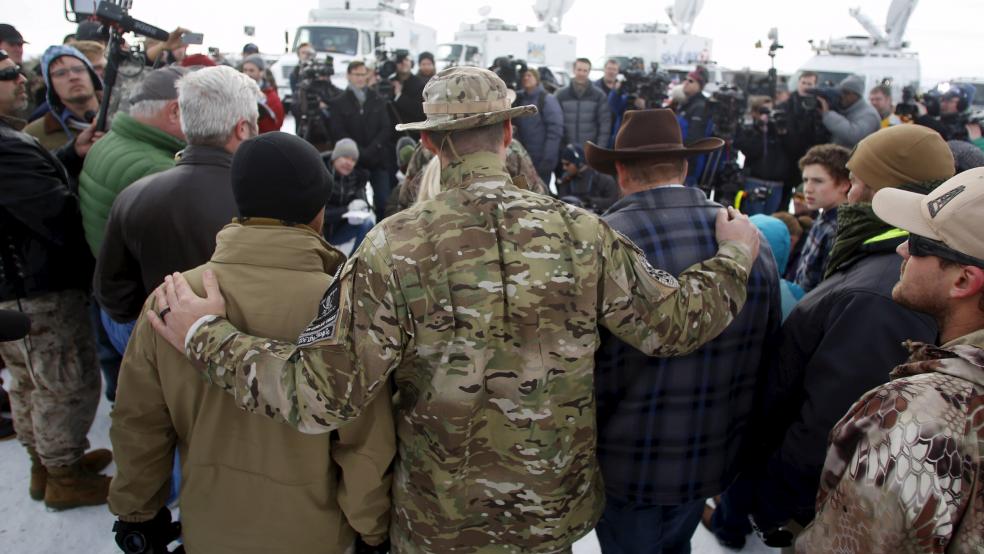WASHINGTON (Reuters) - As the armed occupation of U.S. federal buildings in rural Oregon drags on, some blame the U.S. government for failing to arrest anti-government lawbreakers in western United States after the last big standoff in 2014.
Some former federal officials and lawmakers say they believe anti-government lawbreakers have been emboldened by the Justice Department's failure to prosecute rancher Cliven Bundy, whose 2014 standoff with the government over Nevada grazing rights ended with federal agents backing down in the face of about 1,000 armed militiamen.The Federal Bureau of Investigation has been building a case against participants in that dispute, according to federal and local officials. But prosecutors have yet to bring charges and no arrests of Bundy, his family or others have been made.Bundy's sons, Ammon and Ryan Bundy, are now leading a small group of armed protesters in rural Oregon who seized a federal wildlife center on Saturday in an attempt to win greater local control over federal land. "If people feel like there's no repercussions for their actions, especially if they're acting illegally, it does embolden them," said Bob Abbey, who led the U.S. Bureau of Land Management (BLM) from 2009 to 2012. "Two years should be sufficient time for bringing people to justice."Cliven Bundy's long-running dispute with the BLM over grazing fees turned into a rallying point for the far right in 2014, when hundreds of heavily armed paramilitary activists flocked to his Nevada ranch to prevent federal agents from seizing his cattle. Bundy's sons were also photographed participating in the dispute.Bundy's perceived victory energized a far-right citizens' militia movement that has waxed and waned in the United States over several decades. The Department of Homeland Security predicted in an intelligence report that it would inspire other acts of violence. The BLM said it was still pursuing the Bundy case through the legal system. "Our primary goal remains to resolve this matter safely and according to the rule of the law," spokesman Tom Gorey said. The FBI, the Department of Justice and the U.S. Attorney's office in Nevada declined to comment.Former federal officials say the Justice Department, on the whole, is quick to handle criminal cases involving public lands. But many BLM agents have expressed frustration that the government has not yet brought any charges related to the 2014 standoff, said Ed Shepard, a former BLM Oregon state director who stays in touch with current employees at the agency. "It's a violation of law and they should be held accountable for it," said Shepard, who as president of the Public Lands Foundation represents retired BLM workers. RIPPLING ACROSS THE WESTIn recent years, federal officials have taken a cautious approach when dealing with armed extremists to avoid a repeat of the 1993 siege of the Branch Davidian compound in Waco, Texas, that left more than 80 people dead.The hands-off strategy averts bloodshed, but has enabled participants in the 2014 standoff to scatter across the country.Two people involved in the standoff went on to kill two police officers and one civilian in Las Vegas in June 2014, less than two months after the Nevada standoff at the Bundy ranch ended. Others have discussed plans to seize land and attack federal convoys and helicopters, according to the Homeland Security report, which was released in July of that year.One man involved in the standoff, Washington state resident Schuyler Barbeau, was arrested in a separate incident in December on charges of attempting to sell an unregistered firearm. He told an informant that it was his duty to "lynch" public servants he deemed to be unworthy, according to the charges.Armed members of the Oath Keepers, a paramilitary group involved in the standoff, gathered at mines in Montana and Oregon last year at the request of owners who said they worried the government was going to seize their properties. Both disputes are pending in court.In Oregon, Cliven Bundy is advising his sons by telephone from Nevada, according to Reuters reporters on the scene. An Arizona rancher and friend of the family involved in the Oregon standoff, LaVoy Finicum, told a local TV station he would no longer pay grazing fees.The April 2014 standoff also led to an increase in threats and security risks for the federal employees who police rangeland, deter trespassers and round up stray livestock on public land in the western United States, former officials say.In the weeks after federal agents backed down, two BLM rangers were menaced at gunpoint on a Utah highway, said Juan Palma, the agency’s state director at the time. Archaeologists, biologists and others who often work alone far out in the wilderness were required to travel in pairs for safety, and the agency carefully tracked who was in and out of the office said Palma, now retired."Some of our employees didn't feel comfortable wearing the uniform to be identified in a restaurant," he said.Complex cases like the 2014 Nevada standoff that involve hundreds of suspects are often laborious to assemble, current and former law enforcement officials say, and the current occupation in Oregon further complicates the investigation because many of the same suspects are involved. Prosecutors do not want to risk bringing suspects to trial prematurely if the Oregon incident spurs additional charges, said a former federal law enforcement official familiar with the investigation.But officials involved in the latest armed protest are growing impatient. "What Cliven Bundy and his sons and those around him are doing is domestic terrorism," said Steven Horsford, who as a U.S. congressman for southern Nevada at the time of the standoff was involved in negotiations."They should have absolutely acted by now," he said. (Additional reporting by Jonathan Allen in Oregon and Julia Harte in Washington; Editing by Jason Szep and Lisa Shumaker)Lack of government action over land disputes may embolden Oregon protesters

JIM URQUHART



